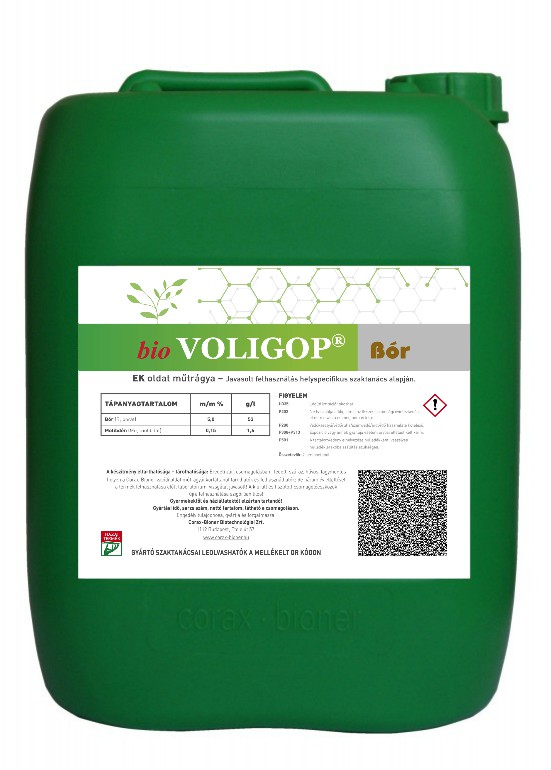
Application field: Bio Foliar Fertilizer
Active Substance: Macro-, mezo-, and micro-elements according to the EC Regulation No 2003/2003.
Sodium and chlorine free premium EC fertiliser
Boron is an essential micro-element, which plays a basic role in the nutrient uptake of plants, in the transport and accumulation of carbohydrates and other assimilates, in germination, in the establishment of root and conductive tissues, in the development of shoot apices and also in flowering and fruiting. Boron participates in the development of the shoot apices, plays an important role in the fertilisation of flowers, in seedling and in the metabolism of carbohydrates. Boron is indispensible in the nitrogen and phosphorus metabolism and in the synthesis of amino acids and proteins.
Plants are unable to store boron, therefore in the case of plants requiring boron (such as rape, sugar beet, sunflower, apple, pear, plum, walnut, peanut, chestnut, raspberry, strawberry, grape, poppy seed, cabbage, kohlrabi, cauliflower, cucurbits, potato, pea, oil flax, oil radish, mustard, bulb vegetables) it has to be continuously supplied. The deterioration of the root apex is a typical symptom of boron deficiency, furthermore in the case of sugar beet and root vegetables (carrot, parsley, celery) brownish cavities, heart rot and dry rot may appear. Upon the absence of boron, symptoms might also be observed on the above-ground areas of the plant: the leaves become yellow, discoloured and withered. In orchards boron plays a determining role in the formation of generative organs (determines the pollen germination ability, fertilisation) and in growth, furthermore in the case of grape it plays an important role in pollen germination and good fertilisation. Typical symptoms of boron deficiency include rosette disease, hampering of flower formation, fall of flowers. Boron deficiency can be detected rather early, by the distorted, brown spots on fruit trees, which later on spread to the pulp.
Boron, together with calcium plays a significant role in the establishment of cell walls, in the growth of plant tissues and in the regulation of plant hormones.
Plants are able to take boron up from the soil in the form of boracic acid and/or in the form of borates. But as these forms move slowly in the plant tissues, the symptoms of deficiency are mainly appearing on the shoot apices, usually in the fertilisation period. In the period prior to shoot formation and fertilisation it is essential that plants are supplied with the required foliar boron quantity, thus we apply boron directly to the place where it is utilised the most efficiently.
Copyright © 2017 Corax Bioner Co. | All rights reserved | Data protection